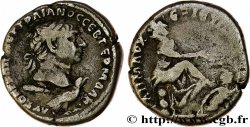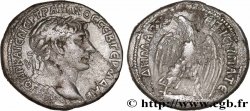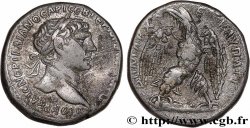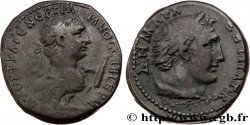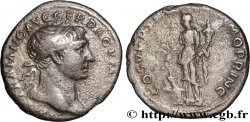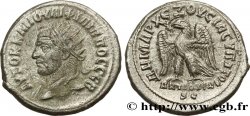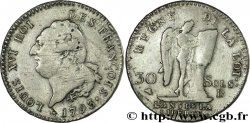175.00 €(Approx. 199.50$ | 148.75£)
Quantity
Add to your cart

Type : Tétradrachme syro-phénicien
Date: 103-109
Mint name / Town : Tyr, Phénicie
Metal : silver
Diameter : 25 mm
Orientation dies : 6 h.
Weight : 14,59 g.
Coments on the condition:
Flan large, centré. Jolis bustes. Usure régulière. Patine grise
Catalogue references :
Obverse
Obverse description : Tête laurée de Trajan à droite (O*) ; au-dessous, un aigle debout à droite et devant Trajan, une massue.
Obverse legend : AUTOKR KAIS NER TRAIANOS SEB GERM DAK., (Autokratoros Kaisaros Neruaos Traianos Sebastos Germanikos Dakikos)
Obverse translation : (L'empereur césar Nerva Trajan auguste germanique dacique).
Reverse
Reverse description : Buste lauré de Melqart (Hercule) à droite, la léonté nouée sur le cou.
Reverse legend : DHMARC. .EX UPAT. E., (Dhmarcikhs Exousias IE Upatos e)
Reverse translation : (Puissance tribunitienne, consul pour la cinquième fois).
Commentary
Rubans de type 1. Le portrait de Melqart est, sur ces tétradrachmes, plus ou moins hellénisé. Sur notre exemplaire il est particulièrement massif et brutal, probablement au plus proche de la représentation cultuelle du héros, donnant une image de force physique très impressionnante, particulièrement par le cou massif de lutteur.








 Report a mistake
Report a mistake Print the page
Print the page Share my selection
Share my selection Ask a question
Ask a question Consign / sell
Consign / sell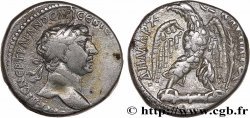
 Full data
Full data